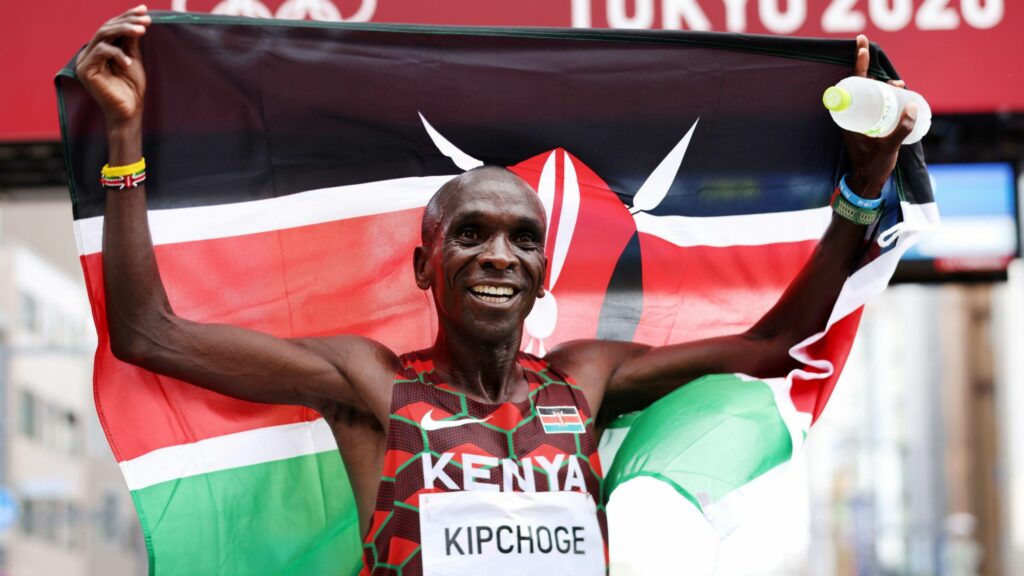
Eliud Kipchoge, a two-time Olympic champion, claims that during a campaign of internet abuse that falsely connected him to the death of fellow Kenyan marathon runner Kelvin Kiptum, he feared for his family’s lives.
In a car accident in February, Kiptum, the world record holder who appeared ready to challenge Kipchoge’s supremacy over 26.2 kilometres, passed away at the age of 24.
Social media users started speculating that Kipchoge was a part of a plot to assassinate Kiptum, who had set a new world record in Chicago last October of two hours, 35 seconds.
The 39-year-old told BBC Sport Africa, “I was shocked that people [on] social media platforms are saying ‘Eliud is involved in the death of this boy.'”
“I never heard worse news in my life than that.
“I’ve heard a lot of horrible things, including that they’re going to burn my house, my family, my investments in town, and the training camp.
“It did not happen but that is how the world is.”
When Kipchoge first noticed the mistreatment and unfounded rumours, he went to make sure his family was secure.
“I am unable to inform the police that my life is in jeopardy. Thus, my main concern was to advise my family to exercise additional caution and awareness,” he stated.
“I began making a lot of calls.
“I began to have severe anxiety about my kids leaving for school and returning.
Sometimes they ride around, but you never know what can happen, so we had to stop them. We began picking them up in the evening and dropping them off.
“My girl was in boarding school – that was positive that she had no access as far as social media is concerned – but it’s tough for my boys to hear ‘Your dad has killed somebody’.”
losing confidence and friends

In an honest conversation in his Eldoret home, Kipchoge was overcome with emotion when talking about the effect the campaign of abuse had on his mother.
“My worst moment was (when) I tried to call my mum,” he said.
“Just take care of yourself. A lot has been going on,” she said to me.
“My hometown is a fairly small place. My mother’s age also made me appreciate how pervasive social media is.
However, she gave me bravery. It was a very difficult month.
But when Kipchoge defended his title in Tokyo in 2021, he became just the third person to win consecutive Olympic marathons; he chose not to put his own safety at risk.
“I saw no meaning to change training venues because my life is open,” he explained.
“Going outside to run is our sport; we don’t train in a facility. I am free to move about the streets.”
Because of the erroneous connection to Kiptum’s injury and the vitriol he received online, Kipchoge says he “lost about 90%” of his friends.
“It was really painful for me to learn even from my own people, my training mates, those who I have contact with, and the bad words are coming from them,” he added.
“I was really down to see that.”
An effect on the outcome

After receiving threats, Kipchoge’s staff chose to remove the distance runner from social media, although he insisted that he had never thought about closing his accounts.
“If I delete my accounts then it shows that there is something I am hiding,” he stated.
“I’ll hold onto my accounts. I didn’t take any action.
But he thinks the vitriol he received on social media impacted how well he competed.
On March 3, Kipchoge finished the Tokyo Marathon in tenth place, which was his lowest result since his debut in 2013. He was more over two and a half minutes behind Benson Kipruto, the winner.
“When I was in Tokyo I had three days which I did not sleep,” he admitted.
“It was my worst ever position.”
Despite that disappointment, he was selected for Kenya’s marathon squad for the 2024 Summer Olympics in Paris on Wednesday. He is now concentrating on making further history at the Games by trying to win a third straight gold medal.
Though in controlled circumstances in Vienna, Kipchoge became the first person to complete a marathon in under two hours in 2019. “It’s about getting up and going straight again, to your goal,” he continued.
“I want to go into history books, to be the first human being to win back-to-back-to-back.”
Cutting down on abuse at Paris 2024

Kipchoge thinks social media companies are “not doing much” to stop abuse on their sites because he has experienced intimidation and threats.
“These faceless people are posting bad things and are really dangerous,” he claimed.
“Some accounts require some time to be deleted once you report them.
“They should move quickly, gather information, and remove accounts. People [should] be aware that their accounts will be removed if they say something bad.”
Kipchoge has applauded the International Olympic Committee’s declaration that it will “respond proactively and at scale” to protect athletes from cyberbullying in the run-up to Paris 2024.
The IOC plans to report abusive posts to social media companies by identifying them with the use of external artificial intelligence.
“I think it’s actually the right direction,” he remarked.
“They are now stamping their authority and their function as an organisation handling the athletes to safeguard them from abuse.”
For Kipchoge, though, it is already too late to stop the psychological damage he has already endured.
“I learned that friendship cannot be forever,” he remarked.
“I find it regrettable that it occurred on the day I’m commemorating more than 20 years in sports.
“I can no longer trust anyone because of what occurred. I refuse to trust anyone, even my own shadow.”





More Stories
Police Arrest Scheffler Following traffic-related Incident
Premier League Showdown: Manchester City vs. West Ham & Arsenal vs. Everton Decide the 2023-2024 Champion
The US Says Boeing Might face Criminal Charges Over the 737 Max Disasters